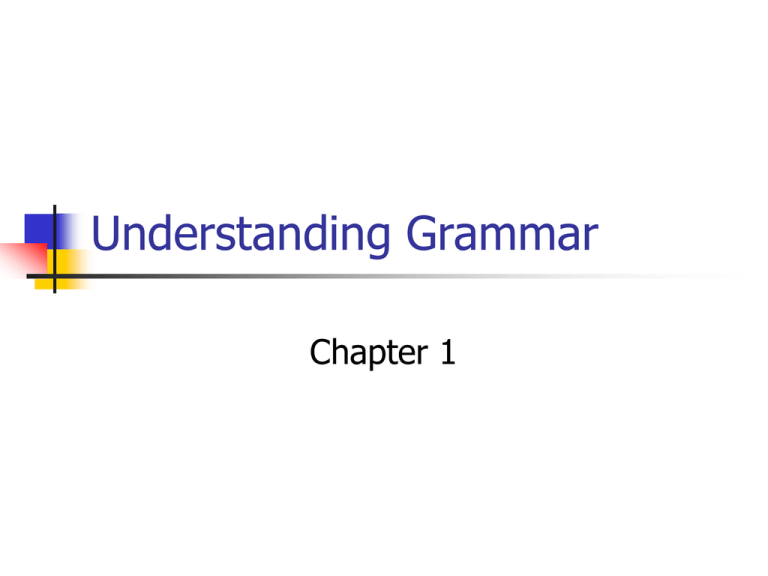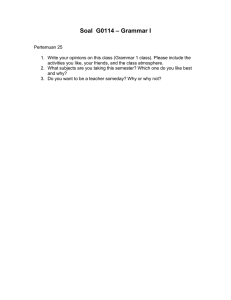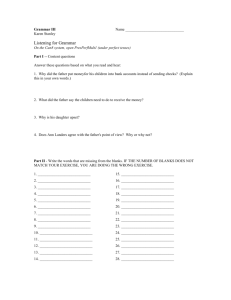Understanding Grammar Chapter 1
advertisement

Understanding Grammar Chapter 1 Group Work: Grammatical Structure Put the sentences in order: Ring bells loudly the. I gave a book my sister. Mary should stop smoking is clear that. Tigers six of the jungle ran out. Ship sails the today. For green its age my well car runs old. She owns many cages bird antique beautiful. Already an expert…? Native speaker competence Then why am I here? Subconscious conscious Better language skills Better understanding of others Better able to help others Why Study Grammar? “The study of grammar is not just of English majors or for future teachers: it is for people in business and industry, in science and engineering, in law and politics. Every user of the language, in fact, will benefit from the consciousness-raising that results from the study of grammar. The more that speakers and writers and readers know consciously about their language, the more power they have over it and the better they can make it serve their needs.” Exercise 1.1 Page 4-5 Do it together… Standard vs. Non- English 1. 2. I don’t have any. I ain’t got none. Prescriptive rules “Correct English is the slang of prigs who write history and essays.” -George Eliot - Modern Linguistics Prescriptivism Dialect / Regionalisms More in Chapter 2 Structural Grammar ≠ I ain’t got none… Phonology Morphology Syntax Transformational Grammar Noam Chomsky Grammatical & Ungrammatical Don gave Karen a present Don gave a present to Karen Don gave it to Karen *Don gave Karen it Challenge: Find a situation where this works… A sentence violates Descriptive rules if no native speaker of English would say it… Prototype Theory If it _____ like a ____, then… looks functions interacts noun verb adjective etc What part of speech is it? – I The dog is sleeping. The sleeping dog is brown. Sleeping is the dog’s favorite pastime. What part of speech is it? – II Did he down his drink? She looks down on him. They walked down the street. He was feeling down… because he fumbled on fourth down. Grammatical? If you would say the sentence (at home or with friends) leave the sentence unmarked. Put an asterisk (*) in front of those that do not conform to the rules of your grammar. Use a question mark (?) if you’re not sure. For green its age my well car runs old. This is the man I took a picture of. Somebody left their book on the train. The secret was kept between him and me. You should get you a new car to drive. Emily might could go to the store. He don’t know nothing about racing. Exercise 1.2 Page 8 Do it now (alone) Compare answers as a group Diagramming I Diagrams Trees Language Change [....]g fæder, þu þe on heofonum eardast, geweorðad wuldres dreame. 1000 AD Oure fader that art in heuenis halowid be thi name. 1400 Our father which art in heauen, hallowed be thy name. 1611 (KJV) Our Father in Heaven, let your holy name be known. 1970 (Condon) Review: Re-write in modern English Thou art a cobbler, art thou? Wherefore rejoice? What conquests bring he home? Dwell I but in the suburbs of your good pleasure? O mighty Caesar, dost thou lie so low? Homework: Exercise 1.3 (page 9) Read Chapter 2



